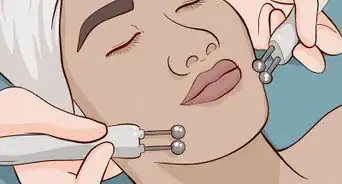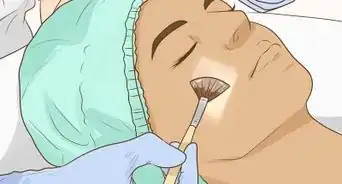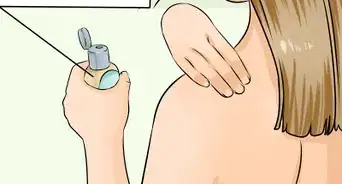This article was co-authored by R. Sonia Batra, MD, MSc, MPH and by wikiHow staff writer, Jessica Gibson. Dr. R. Sonia Batra is a board certified Dermatologist and the Founder of Batra Dermatology based in Los Angeles, California. With over 15 years of experience, Dr. Batra specializes in lasers, medical devices, patient and public medical education, and skin cancer research. She received her Bachelor’s degree, Master’s degree in Public Health, and her Doctor of Medicine (MD) degrees from Harvard University. As a Rhodes Scholar, she earned a Master’s degree in Molecular Genetics at the University of Oxford. She completed her residency training in Dermatology at Stanford University. Dr. Batra has contributed and reviewed for the Journal of Dermatologic Surgery, the Journal of the American Academy of Dermatology, and JAMA Dermatology. She is also a co-host of CBS’ Emmy award-winning television show, The Doctors.
There are 15 references cited in this article, which can be found at the bottom of the page.
This article has been viewed 32,213 times.
If you've lost a lot of weight, you might be surprised to see loose pockets or folds of excess skin. Although surgery is one of the best ways to remove or deal with loose skin, you may be able to improve the appearance of your skin by taking supplements that increase collagen production, eating nutritious food, and protecting your skin from further damage in order to help your skin repair itself.
Steps
Taking Care of Your Skin
-
1Take collagen to help your skin repair itself. Although more research is needed on people who have lost a lot of weight, studies show that collagen is promising. Taking a collagen supplement can make your skin stronger and help it repair itself. You can take a liquid, powder, or capsule supplement every day.[1]
- Purchase a collagen supplement from health stores, supplement stores, or online.
Tip: If you don't want to take a supplement, you can get collagen in your diet by eating bone broth.
-
2Add a vitamin C supplement to increase collagen that tightens your skin. Although you can get vitamin C from fresh produce, you might want to take a vitamin C supplement so your body makes more collagen and elastin. These can make your skin appear tighter, reduce wrinkling, and make your skin look smoother.[2]
- To take a vitamin supplement, follow the manufacturer's dosing instructions or ask for your doctor's advice.
Advertisement -
3Take an omega-3 fatty acid supplement every day to improve elasticity. Omega-3 fatty acids may improve the appearance of wrinkled or aging skin. Look for a supplement that contains omega-3 fatty acids from salmon, mackerel, tuna, or cod liver. Then, take it according to the manufacturer's directions.[3]
- You may be able to find an omega-3 fatty acid supplement that also contains vitamin C.
-
4Moisturize your skin every day to keep it hydrated. Look for moisturizers that contain vitamin C or a retinoid, such as retinoid, since these can increase collagen within your skin. Spreading moisturizer on your skin may reduce the appearance of fine wrinkles.[4]
- Keeping your skin hydrated can also prevent deep wrinkles from developing.
-
5Apply sunscreen every day to protect your skin from damage. Dermatologists agree that covering your skin with sunscreen even on cloudy days is one of the best ways to keep your skin healthy. Spread a broad-spectrum sunscreen with a minimum sun protection factor (SPF) of 30 on your skin about 30 minutes before going outside, especially if you'll be getting in water.[5] [6]
- If your skin gets sunburned, the cells will be damaged and they won't be able to repair and tighten the skin as easily as healthy cells.
-
6Cover your skin and don't use tanning beds. In addition to wearing sunscreen, you should protect your skin from direct sunlight since the rays make your skin wrinkle and loosen even more. Wear clothes that cover your loose skin and try to stay out of direct sunlight. You should also avoid tanning beds since these will damage your skin's cells.[7]
- If your skin cells become damaged, it's harder for them to make collagen and elastin which tighten the skin.
Making Lifestyle Changes
-
1Eat more fruits and vegetables to improve the health of your skin. Many types of fresh produce are high in vitamin C and antioxidants which can protect your skin and help it heal itself. Try to eat at least 3 to 5 servings of fruits and vegetables every day. These are great sources of vitamin C:[8]
- Strawberries
- Citrus
- Cantaloupes
- Spinach
- Sweet potatoes
- Broccoli
Tip: You should also cut back on saturated fats and sugar which can cause inflammation in your skin and lead to weight gain.
-
2Include protein-rich food in your diet. Your skin needs amino acids from protein in order to make collagen that repairs the skin. Although you can add protein powder to shakes or meals, you can also get lots of protein from:[9]
- Chicken
- Fish
- Low-fat dairy: skim milk, low-fat yogurt and low-fat cottage cheese
- Lean beef
- Eggs
- Beans
- Nuts
-
3Quit smoking or take steps to cut back. Smoking can make it harder for your skin to regenerate and heal, so try to quit or cut back as much as you can. This can improve the texture of your skin and its elasticity, so it's more likely to tighten.[10]
- If you're finding it difficult to stop smoking, look into local support groups that you can join. You might find that it's easier to quit if you can share your struggles with others who are going through the same thing.
-
4Add strength training 2 to 3 times a week to your current exercise regimen. You probably have an exercise routine that's helped you lose weight. If you don't already include strength training, start lifting free weights or using weight machines to build muscle. Building muscle can tighten and tone the muscles under your skin, which will give your skin a tighter appearance.[11]
- For free weights, you could lift barbells, dumbbells, or hand weights.
Considering Surgery
-
1Ask your doctor about surgery to remove excess skin. The amount your skin is able to tighten depends on how healthy your skin is, your genetics, and how old you are. If you've tried tightening your skin at home but aren't pleased with the results, talk with your doctor about what treatments are available.[12]
- Check with your insurance company to determine if they'll cover surgical procedures.
Did You Know? Your surgeon will require you to keep the weight off for at least 3 to 6 months before considering you for surgery.[13]
-
2Get surgery to remove excess skin. A plastic surgeon will determine how much excess skin to cut away.[14] Once they've removed the skin, they'll lift, tuck, or reshape the existing skin in order to contour your body.[15]
- In addition to surgically removing the skin, you might also want to get liposuction to remove excess fat.
-
3Recover from plastic surgery. Follow your surgeon's recovery plan and take pain medication according to your doctor's directions. You might need to limit physical activity until your surgery site has fully healed. In the meantime, try to rest and take care of yourself.[16]
- Attend follow-up appointments with your doctor. They may need to change medication that you're on and ensure that your surgery site is healing properly.
-
4Develop an exercise and nutrition plan for after the surgery. To keep the weight off and stay healthy, it's important to make a personalized diet and exercise plan. Work with your doctor to create a realistic exercise and nutrition plan. Your plan might include:
- Cardio exercise 2 to 3 times a week
- Balancing your diet
- Watching your calorie intake
- Walking 5 days a week
Expert Q&A
-
QuestionHow do I avoid saggy skin after losing weight?
 R. Sonia Batra, MD, MSc, MPHDr. R. Sonia Batra is a board certified Dermatologist and the Founder of Batra Dermatology based in Los Angeles, California. With over 15 years of experience, Dr. Batra specializes in lasers, medical devices, patient and public medical education, and skin cancer research. She received her Bachelor’s degree, Master’s degree in Public Health, and her Doctor of Medicine (MD) degrees from Harvard University. As a Rhodes Scholar, she earned a Master’s degree in Molecular Genetics at the University of Oxford. She completed her residency training in Dermatology at Stanford University. Dr. Batra has contributed and reviewed for the Journal of Dermatologic Surgery, the Journal of the American Academy of Dermatology, and JAMA Dermatology. She is also a co-host of CBS’ Emmy award-winning television show, The Doctors.
R. Sonia Batra, MD, MSc, MPHDr. R. Sonia Batra is a board certified Dermatologist and the Founder of Batra Dermatology based in Los Angeles, California. With over 15 years of experience, Dr. Batra specializes in lasers, medical devices, patient and public medical education, and skin cancer research. She received her Bachelor’s degree, Master’s degree in Public Health, and her Doctor of Medicine (MD) degrees from Harvard University. As a Rhodes Scholar, she earned a Master’s degree in Molecular Genetics at the University of Oxford. She completed her residency training in Dermatology at Stanford University. Dr. Batra has contributed and reviewed for the Journal of Dermatologic Surgery, the Journal of the American Academy of Dermatology, and JAMA Dermatology. She is also a co-host of CBS’ Emmy award-winning television show, The Doctors.
Board Certified Dermatologist Use skincare products that have retinol and alpha hydroxy to help maintain your skin elasticity.
Use skincare products that have retinol and alpha hydroxy to help maintain your skin elasticity.
References
- ↑ https://www.ncbi.nlm.nih.gov/pubmed/26362110
- ↑ https://www.ncbi.nlm.nih.gov/pmc/articles/PMC5579659/
- ↑ https://www.ncbi.nlm.nih.gov/pmc/articles/PMC3583891/
- ↑ https://www.ncbi.nlm.nih.gov/pmc/articles/PMC3266803/
- ↑ R. Sonia Batra, MD, MSc, MPH. Board Certified Dermatologist. Expert Interview. 19 February 2021
- ↑ https://www.cancer.org/latest-news/choose-the-right-sunscreen.html
- ↑ https://www.ncbi.nlm.nih.gov/pmc/articles/PMC3583892/
- ↑ https://health.clevelandclinic.org/23-foods-good-skin/
- ↑ https://www.hsph.harvard.edu/nutritionsource/what-should-you-eat/protein/
- ↑ https://www.ncbi.nlm.nih.gov/pubmed/20839421
- ↑ https://kidshealth.org/en/teens/strength-training.html
- ↑ https://www.ncbi.nlm.nih.gov/pmc/articles/PMC3111107/
- ↑ http://www.pamf.org/cosmeticsurgery/information/after-surgery.html
- ↑ R. Sonia Batra, MD, MSc, MPH. Board Certified Dermatologist. Expert Interview. 19 February 2021
- ↑ https://www.menshealth.com/weight-loss/a26424334/loose-skin-after-weight-loss/
- ↑ http://www.yourplasticsurgeryguide.com/checklists/9-tips.htm
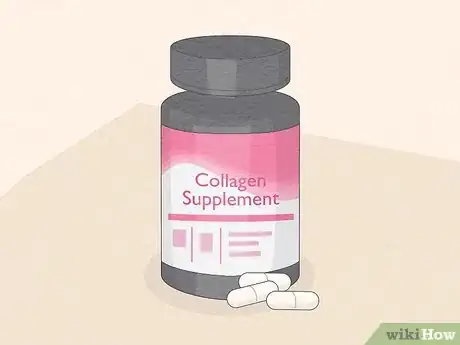



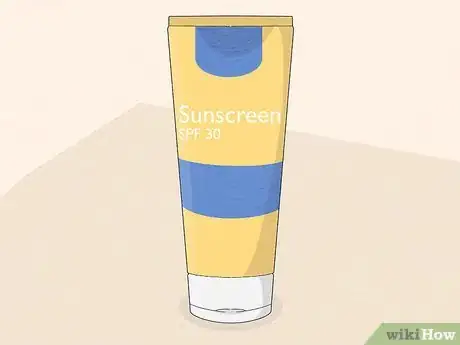




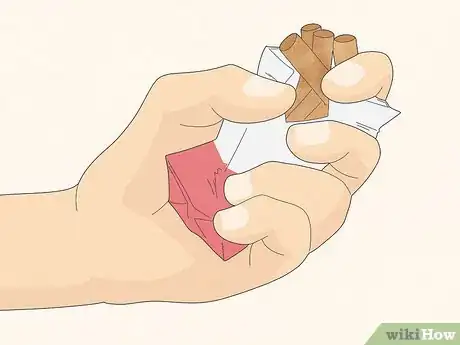











-Electric-Shock-Step-9.webp)

